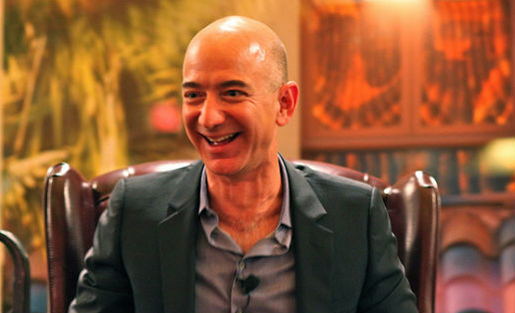It’s a scary but exciting world for newspaper owners right now, especially if they’re in a selling mood. Jeff Bezos, the founder and CEO of Amazon, bought the Washington Post last week (while our podcast was on vacation — great timing!), and Red Sox owner John Henry bought the Boston Globe before that. As newspapers continue to struggle to raise advertising or subscription revenue, will the journalism industry be aided or hindered when it’s owned by billionaires? Special guests Nick Wingfield from the New York Times and Jack Shafer from Reuters join this week’s episode of the Mediatwits. MediaShift’s Mark Glaser hosts, along with Mónica Guzmán from the Seattle Times and GeekWire, Ana Marie Cox from the Guardian and Andrew Lih from American University.
CORRECTION: In the podcast, Monica Guzman says that the Seattle Times sold their headquarters building to Amazon. Actually, the Seattle Times sold the property to a developer.
Watch or listen to the podcast here:
Subscribe to the MediaShift audio podcast here.
Listen to the Mediatwits and follow us on SoundCloud!
Thanks to SoundCloud for providing audio support. Subscribe to the Mediatwits audio version via iTunes.
Follow @TheMediatwits on Twitter.
Mediatwits Bios

Ana Marie Cox is a senior political columnist for The Guardian. She is the founding editor of the Wonkette blog and has covered politics and the culture of Washington, D.C. for outlets including the Washington Post, Playboy, GQ, Mother Jones and Elle. She is the author of the novel “Dog Days” and lives in St. Paul, Minn. Follow her on Twitter @anamariecox.
Mark Glaser is executive editor of MediaShift and Idea Lab. He is a longtime freelance writer and editor, who has contributed to magazines such as Entertainment Weekly, Wired and Conde Nast Traveler, and websites such as CNET and the Yale Global Forum. He lives in San Francisco with his wife Renee and son Julian. You can follow him on Twitter @mediatwit.
Mónica Guzmán is a columnist for the Seattle Times and Northwest tech news site GeekWire and a community strategist for startups and media. She emcees Ignite Seattle, a grab-bag community-fueled speaker series. Mónica was a reporter at the Seattle Post-Intelligencer and seattlepi.com, its online-only successor, where she ran the experimental and award-winning Big Blog and drew a community of readers with online conversation and weekly meetups. Follow her on Twitter @moniguzman.
Andrew Lih is a new media journalist and associate professor of journalism at the American University School of Communication. He is the author of “The Wikipedia Revolution” (Hyperion 2009, Aurum UK 2009) and is a noted expert on online collaboration and journalism. He is a veteran of AT&T Bell Laboratories and in 1994 created the first online city guide for New York City (www.ny.com). Follow him on Twitter @fuzheado and buy his book here.
Special Guests
 Nick Wingfield has been a Seattle-based technology correspondent for the New York Times since 2011. Before that, he covered technology for 14 years for the Wall Street Journal in Seattle, San Francisco and New York.
Nick Wingfield has been a Seattle-based technology correspondent for the New York Times since 2011. Before that, he covered technology for 14 years for the Wall Street Journal in Seattle, San Francisco and New York.
 Jack Shafer writes a column about the press and politics for Reuters, which he joined in September 2011. Previously, he worked at Slate for 15 years, first as deputy editor and then as the site’s “Press Box” columnist. Before Slate, Shafer spent 11 years editing two alternative weeklies–SF Weekly and Washington City Paper–where he estimates he rewrote, massaged, or merely pressed the button on 500 features. Shafer’s first salaried job in journalism was at Inquiry magazine, where he was the managing editor. His work has been published in the New York Times Magazine, the Times Book Review, the Columbia Journalism Review, the New Republic, BookForum, the op-ed page of the Wall Street Journal, and elsewhere. He has been writing about the press for about 30 years, god save his soul.
Jack Shafer writes a column about the press and politics for Reuters, which he joined in September 2011. Previously, he worked at Slate for 15 years, first as deputy editor and then as the site’s “Press Box” columnist. Before Slate, Shafer spent 11 years editing two alternative weeklies–SF Weekly and Washington City Paper–where he estimates he rewrote, massaged, or merely pressed the button on 500 features. Shafer’s first salaried job in journalism was at Inquiry magazine, where he was the managing editor. His work has been published in the New York Times Magazine, the Times Book Review, the Columbia Journalism Review, the New Republic, BookForum, the op-ed page of the Wall Street Journal, and elsewhere. He has been writing about the press for about 30 years, god save his soul.
Podcast topics
WaPo sale to Amazon founder
Jeff Bezos is known for founding online book retailer Amazon, and now he’s known for buying the august (but failing) Washington Post newspaper and an assortment of other Post Co. newspapers for $250 million in his pocket change. The purchase was a surprise to the journalism industry, which never foresaw the long-standing Graham family ending their 80-year ownership of the Washington Post — at least, not like this. There are concerns for Bezos’s history as a manager, as well as potential conflicts of interest as Amazon continues build political clout. But optimists point to Bezos’s ability to dramatically reinvent business models, propel journalist innovation and make decisions as integral as picking the right publisher.
How has this model of the billionaire-owned paper worked in the past? Can someone like Bezos find the answer for papers to survive?
Boston Globe sold to John Henry, owner of Red Sox
The Washington Post wasn’t the only major paper sold off recently, with the Boston Globe finding a new owner in Red Sox owner John Henry. Though he has no newspaper or digital innovation chops, the New York Times Company, which previously owned the Globe, said he has “strong local roots and a deep appreciation of the importance of these publications to the Greater Boston community.” Henry bought the Globe along with a number online properties such as Boston.com for $70 million.
Is the New York Times next?
If you ask Arthur Sulzberger Jr., publisher and chairman of the New York Times, “the answer to that is no.” Citing growth in digital subscriptions and online innovation, the Times’ management say there’s no need to sell the paper. That doesn’t stop questions about the organization’s overall health, especially since the company just sold the Globe. Reuter’s Jack Shafer, National Memo’s David Clay Johnson and others have suggested New York City Mayor Michael Bloomberg could purchase the Times to bolster his political clout after leaving office (Shafer less enthusiastically than Johnson).
PBS MediaShift Related Coverage
Bezos Could Deliver a Bold New Way of Packaging Content at the Post by Gabriel Kahn
No Change? Jeff Bezos Will Turn the Washington Post Upside Down by Janet Asteroff
What Could Jeff Bezos Want With the Washington Post? by Dan Pacheco
Poll: Which Tech Billionaire Will Buy the Next Newspaper by Mark Glaser
Storify: Jeff Bezos Shocks the World, Buys Washington Post by Zach C. Cohen
Special Guests’ Coverage of the Topic
Technology Industry Extends a Hand to Struggling Print Media by Nick Wingfield
The next publisher of the Washington Post is… by Jack Shafer
Jeff Bezos is an owner who knows how to deliver by Jack Shafer
Other headlines
NYT editor says staff handled site outage ‘with patience, determination and even good humor’ (Romenesko)
Bleacher Report Founder Responds to Fury Surrounding His New ‘Feminist Publication’ (The Wrap)
All San Francisco Chronicle Content Is No Longer Behind A Paywall (San Francisco Appeal)
Al Jazeera America Debuts Website Ahead of Channel Launch (TV Newser)
Poll
Don’t forget to vote in our weekly MediaShift poll:
Zach C. Cohen is an editorial intern for PBS MediaShift studying abroad at la Universidad Nacional in Heredia, Costa Rica. Get regular updates from @Zachary_Cohen on Twitter or on his blog.

